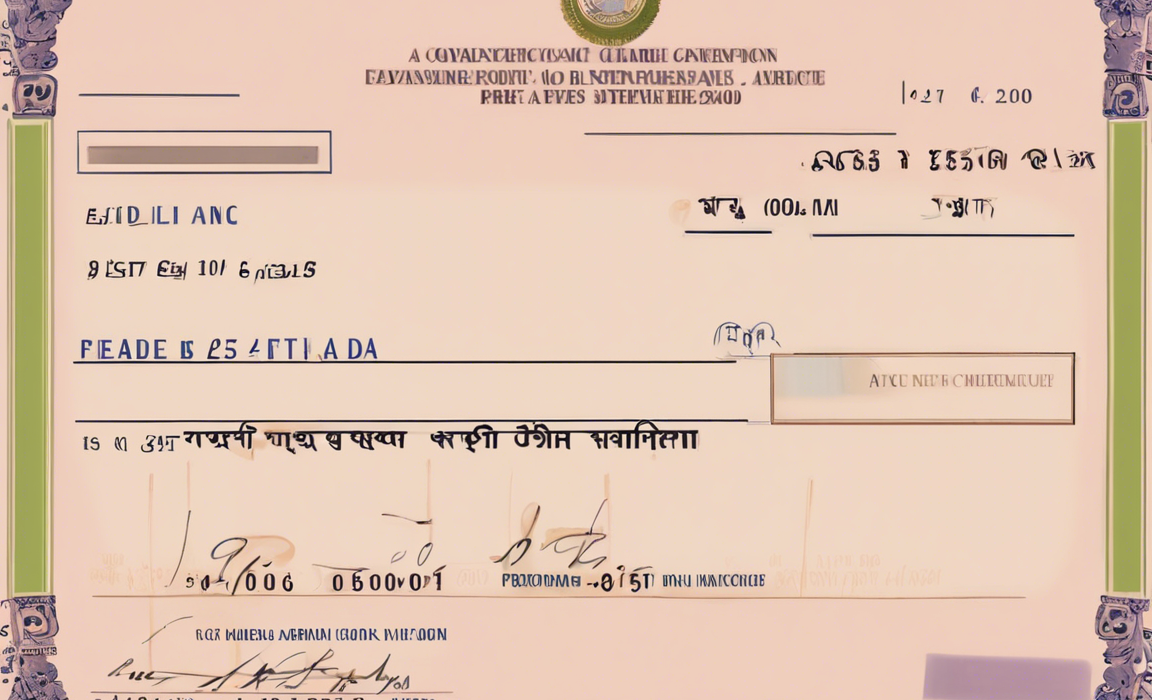A/C Payee Cheques: A Comprehensive Guide
In the world of banking and financial transactions, A/C payee cheques play a critical role in ensuring the security and validity of payments. Understanding the intricacies of A/C payee cheques is essential for both individuals and businesses to prevent fraud, ensure the safe transfer of funds, and comply with banking regulations. This comprehensive guide aims to provide you with a deep dive into what A/C payee cheques are, how they work, and why they are important in the realm of financial transactions.
What is an A/C Payee Cheque?
An A/C payee cheque, also known as an account payee cheque, is a type of cheque that ensures the amount mentioned on the cheque is deposited directly into the payee’s bank account. When a cheque is marked as A/C payee, it can only be deposited into the account of the person or entity named as the payee on the cheque. This provides an added layer of security and reduces the risk of the cheque being fraudulently endorsed or cashed by someone else.
How Do A/C Payee Cheques Work?
When you receive an A/C payee cheque, you must deposit it into your bank account. You cannot cash an A/C payee cheque over the counter at a bank or financial institution. Once the cheque is deposited into your account, the funds are typically made available to you within a few business days, depending on the bank’s clearing process.
Why Are A/C Payee Cheques Important?
A/C payee cheques are important for several reasons:
-
Security: A/C payee cheques are more secure than regular bearer cheques as they can only be deposited into the specified payee’s account.
-
Fraud Prevention: By designating a cheque as A/C payee, the issuer ensures that the funds reach the intended recipient and cannot be misused by unauthorized individuals.
-
Compliance: Some transactions, especially large payments or those involving businesses, may require A/C payee cheques to ensure transparency and accountability.
Difference Between A/C Payee and Crossed Cheques
While A/C payee cheques ensure that the funds are deposited directly into the payee’s account, crossed cheques have two parallel lines drawn across the cheque. Crossed cheques can only be deposited into a bank account and not cashed over the counter. A/C payee cheques, on the other hand, specifically designate the funds for the account of the named payee.
How to Write an A/C Payee Cheque?
When issuing an A/C payee cheque, it’s important to follow these steps to ensure the cheque is processed correctly:
-
**Write “A/C Payee” or “Account Payee Only” between the // on the top left-hand corner of the cheque.
-
**Write the payee’s name clearly on the “Pay” line.
-
**Specify the amount in both words and figures to avoid discrepancies.
-
**Sign the cheque at the bottom right-hand corner as the drawer.
Can A/C Payee Cheques Be Endorsed?
A/C payee cheques are not intended to be endorsed or transferred to another party. The funds must be deposited into the account of the named payee. If the payee wishes to transfer the funds to another party, they must do so through a legitimate bank transfer or other authorized means.
Security Features of A/C Payee Cheques
Banks incorporate various security features into A/C payee cheques to prevent fraud and ensure the integrity of the transaction. Some common security features include:
-
Watermarks: Special watermarks are embedded into the cheque paper to deter counterfeiting.
-
Signature Panel: Secure signature panels are provided for the drawer to sign, enhancing authentication.
-
Microprinting: Tiny text or symbols that are difficult to replicate are included on the cheque.
Frequently Asked Questions (FAQs)
-
Can I cash an A/C payee cheque at the bank counter?
No, A/C payee cheques can only be deposited into a bank account and not cashed over the counter. -
Is there a limit on the amount for A/C payee cheques?
There is no specific limit for A/C payee cheques, but large transactions may require additional documentation or verification. -
Can I convert a regular cheque into an A/C payee cheque?
Yes, you can convert a regular cheque into an A/C payee cheque by crossing it and adding the “A/C Payee” or “Account Payee Only” designation. -
What happens if an A/C payee cheque is lost or stolen?
If an A/C payee cheque is lost or stolen, you should immediately inform your bank to stop the payment and issue a replacement cheque. -
Are A/C payee cheques used for online transactions?
A/C payee cheques are primarily used for physical transactions involving paper cheques and may not be applicable to online transactions. -
Can I deposit an A/C payee cheque into someone else’s account?
A/C payee cheques should be deposited into the account of the named payee. Depositing it into someone else’s account may require additional authorization or approval. -
Are there any extra charges for issuing A/C payee cheques?
Banks may charge a nominal fee for issuing A/C payee cheques, especially for bulk or special order requests. -
Can I cancel an A/C payee cheque after issuing it?
If the A/C payee cheque has not been deposited or encashed, you may be able to request a stop payment or cancellation through your bank. -
Do A/C payee cheques expire?
A/C payee cheques do not have an expiration date, but it’s best to deposit them promptly to avoid any issues or complications. -
Are A/C payee cheques mandatory for all transactions?
A/C payee cheques may not be mandatory for all transactions, but they are recommended for high-value payments and added security.
Conclusion
In conclusion, A/C payee cheques are a vital tool in the realm of financial transactions, providing security, fraud prevention, and accountability. Understanding how A/C payee cheques work, their importance, and how to handle them correctly is crucial for both individuals and businesses. By following best practices and ensuring compliance with banking regulations, you can leverage the benefits of A/C payee cheques to safeguard your transactions and finances effectively.


